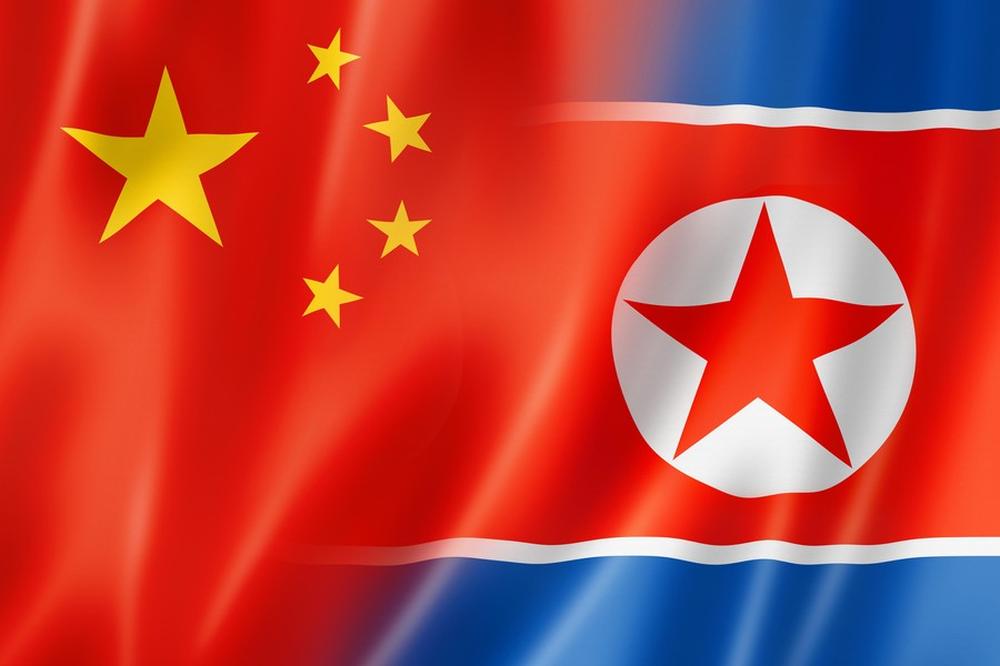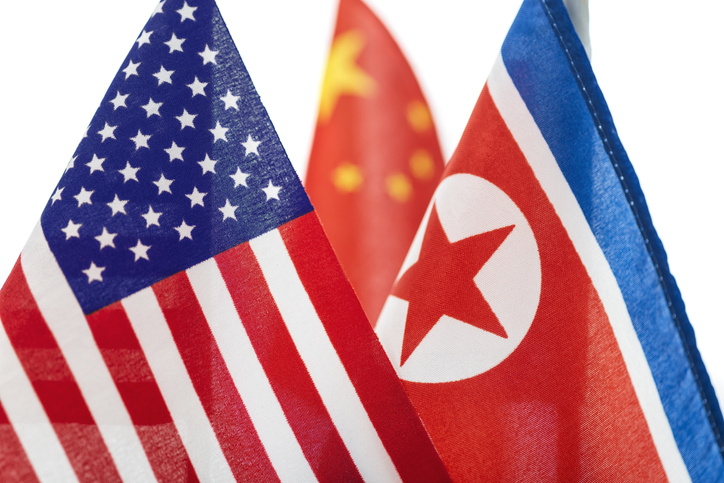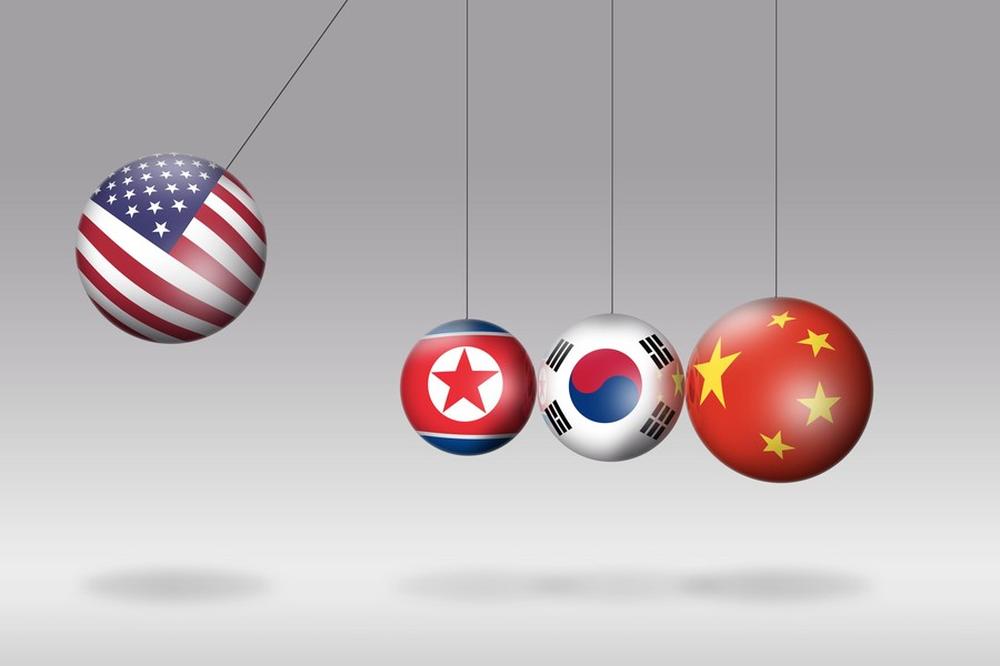- #China
- #Global Issues
- #North Korea
- #US Foreign Policy

► Those who view China as a spoiler argue that it provides North Korea just enough breathing space to withstand the impact of sanctions. However, applying too much pressure could result in a military provocation which could then lead to a humanitarian crisis.
► Considering that the only way to convince North Korea is to mix-and-match pressure and incentives, it is important to utilize China’s leverage over the North to bring the latter back to the negotiating table.
► China has insisted that a “dual track strategy” of linking denuclearization with a peace mechanism on the Korean Peninsula is the way forward. It appears that negotiations over North Korea’s denuclearization will, in one form or another, resemble this “dual track strategy.” It is within this framework that China must act as a facilitator to bring about denuclearization and a peace regime on the Korean Peninsula.
Sino-DPRK Honeymoon Relationship
Despite facing threats from the COVID-19 pandemic, natural disasters caused by climate change, and the intensification of US-China strategic competition, North Korea and China are enjoying a “honeymoon” relationship. These two countries seek a strategically symbiotic relationship that improves their chances of survival and expands their influence amidst a rapidly changing international security environment. They have continued to enhance cooperation in order to affirm their socialist national identities, seek economic breakthroughs, and secure geopolitical survival.
So far this year, the leaders of North Korea and China have eagerly exchanged letters and friendly messages to congratulate the 100th anniversary of the Chinese Communist Party and to express concerns over COVID-19 and North Korean floods. The Sino-DPRK honeymoon relations reached their peak in July when they celebrated the 60th anniversary of the Treaty on Friendship, Cooperation and Mutual Assistance. During this occasion, the two sides emphasized that their “blood” relations remain strong even though times have passed and the world has changed. This treaty, which was signed in 1961 during the height of the Cold War, has become increasingly important in today’s security environment accented by US-China competition.
However, Sino-DPRK relations have experienced fluctuations caused by domestic factors as well as changes in the global security environment. The relationship endured a cold spell when Xi Jinping became Chinese president in 2012 and North Korea began conducting multiple nuclear tests. Relations reached their worst when North Korea went against China’s wishes and continued its nuclear weapon tests, which led to China joining the UN sanctions regime.
In 2018, the two countries were presented with an opportunity to improve relations when North Korea and the United States began preparing for their summit meeting. Just prior to and immediately following his meeting with President Trump, Chairman Kim Jong-un met with President Xi Jinping in search of support. By improving relations with North Korea, China tried to establish its position on the Korean Peninsula, where the security environment was quickly changing as a result of the US-DPRK summit. Chairman Kim visited China three times in 2018 and once in 2019. President Xi reciprocated Chairman Kim by visiting North Korea in 2019. During the five Sino-DPRK summit meetings, the two leaders formed a consensus on the direction of Korean Peninsula affairs and discussed ways to enhance cooperation between the two countries.
Since the Cold War, China has possessed critical leverage over North Korea in the form of economic exchanges. For North Korea, China has been its only economic lifeline especially since economic sanctions have exacerbated its economic difficulties. In the 2000s, Sino-DPRK trade and investments grew, including infrastructure projects such as the construction of the new Yalu River bridge as well as the Rason Special Economic Zone. When the international sanctions regime was strengthened, which placed a complete ban on North Korean exports and restricted imports of petroleum and refined oil, North Korea was forced to rely heavily on China through both official and unofficial means.
Following President Xi’s visit to North Korea in 2018, Sino-DPRK trade relations improved. The processing-on-commission trade involving clothing, watches, and other products around the border area increased. Tourism, which was not targeted by sanctions, allowed a growing number of Chinese tourists to visit the North and became an important source of foreign currency. However, when North Korea closed its borders since January 2020 in response to COVID-19, tourism stopped and Sino-DPRK trade decreased dramatically. Sino-DPRK trade has fallen by 80% from 2.09 billion dollars in 2019 to 540 million dollars in 2020.
North Korea appears to be in dire economic difficulties caused by economic sanctions, COVID-19, and natural disasters. Chairman Kim even admitted that the country is facing a “situation akin to war.” Recently, North Korea has brought in quarantine equipment into Uiju Airport and announced its plan to establish the Musan Export Processing Zone in anticipation of resuming trade with China.
China is expected to supply the North with food and other necessities, with the goal of addressing North Korea’s humanitarian problem as well as maintaining its leverage. As Chinese Foreign Minister Wang Yi recently stated, China is not only providing humanitarian assistance to North Korea but is now arguing for sanctions relief.
Sino-DPRK Strategic “win-win” Relationship
The reason behind China’s friendly attitude towards North Korea and the latter’s approval of Chinese foreign policy is due to the alignment of strategic understanding between the two countries. First and foremost, China and North Korea share a common understanding regarding the importance of maintaining their socialist identities. Specifically, the two countries share the common goal of remaining as socialist and party-oriented regimes. This bond allows the two countries to share a sense of solidarity that goes beyond the diplomatic relations between any two countries.
From a geopolitical standpoint, China and North Korea find themselves in a structural environment that makes them virtually inseparable. The sharing of the border explains how the two countries have been able to maintain and will continue to maintain close relations. China sees its relations with North Korea as “lips and teeth” and considers North Korea as a buffer zone. It considers border stability as a key national interest. It is for this reason that China has looked to maintain its influence and leverage over North Korea.
From North Korea’s perspective, its relations with China—a country with which it shares a border—has to be its most important. This is especially the case since China holds the key to its economic survival. For obvious reasons, North Korea does have concerns that its dependence on China limits its diplomatic options and forces it into economic subordination.
As the US-China strategic competition intensifies, the strategic value of North Korea has grown for China. This strategic competition has spilled over into areas of diplomacy, security, economy, territory, and values, among others. It is also taking place in east Asia, southwest Asia, and central Asia—areas that surround China and its borders. Therefore, China sees North Korea as an importance strategic piece to counter the United States and, for this reason, has defended North Korea as much as it could.
North Korea understands that improving relations with the United States is important for its survival and economy. At the same time, it understands that better relations with China—who is a supporter and serves as a safety net—is required. Its relations with China are seen as a prerequisite to survival as it seeks to maximize profit while balancing the United States and China.
Peace on the Korean Peninsula and China’s Role as a Facilitator
Will China’s policy towards the North help or harm the process of resolving the North Korean nuclear crisis? Will China serve as a facilitator or a spoiler? The answer to these questions is double-sided. Those who view China as a spoiler argue that it provides North Korea just enough breathing space to withstand the impact of sanctions. However, applying too much pressure could result in a military provocation which could then lead to a humanitarian crisis. Considering that the only way to convince North Korea is to mix-and-match pressure and incentives, it is important to utilize China’s leverage over the North to bring the latter back to the negotiating table.
On the other hand, China hopes to have a prominent role in resolving the North Korean nuclear issue and establishing a peace regime on the Korean Peninsula. It has argued that a “dual freeze”—halting ROK-US joint military exercises and North Korean nuclear and missile tests—will serve as a starting point for North Korean denuclearization. Broadly speaking, the beginning of US-DPRK dialogue during the Trump administration and the maintaining of the status quo during the Biden administration can be interpreted as being based on this policy of “dual freeze.”
China has insisted that a “dual track strategy” of linking denuclearization with a peace mechanism on the Korean Peninsula is the way forward. It appears that negotiations over North Korea’s denuclearization will, in one form or another, resemble this “dual track strategy.” It is within this framework that China must act as a facilitator to bring about denuclearization and a peace regime on the Korean Peninsula.
Convincing North Korea back to dialogue and cooperation will require China’s active participation. Moreover, it is important for the Republic of Korea and China to expand the scope of their strategic dialogue so that China can play a constructive role in coming up with a roadmap for future negotiations over denuclearization and peace regime on the Korean Peninsula.
Dr. Jong-Chul Park is a Distinguished Research Fellow at the Korea Institute for National Unification. He received his Ph. D. in Political Science from Korea University, Seoul, South Korea. He was a visiting scholar at Harvard University in 1997-1998, a visiting scholar at Tokyo University in 2007, and a visiting research fellow at Japan Institute for International Affairs in 2007. His recent publications include: The U.S.-China Relations in the New Normal Era and South Korea's North Korea Policy (2019), Prospect for Peace regime Building on the Korea Peninsula (2018), Integration After Korean Unification (2017), Prospect for Change of Kim Jung-Un Regime and South Korea's Policy Directions (2013), Easing International Concerns over A Unified Korea and Regional Benefits of Korean Unification (2012), An Evaluation of South Korea's Policy toward North Korea in 2000s and Policy Alternative (2012), and Peace on the Korean Peninsula and North Korea's Denuclearization: An Application of Cooperative Threat Reduction to Korean Peninsula (2011), et al.


